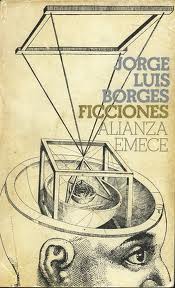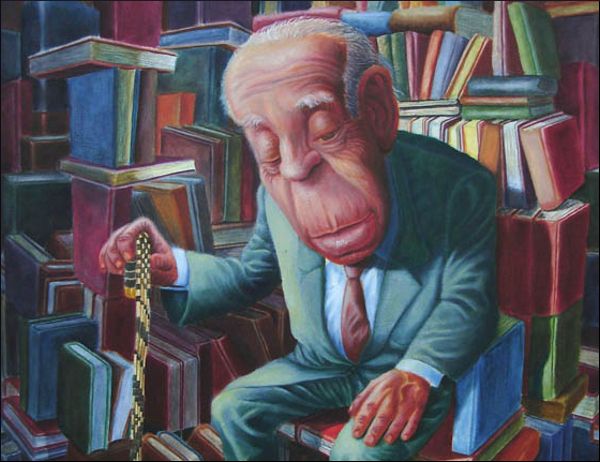
- Ficciones
- Published by: Editorial Sur
- Level: Intermediate
- First Published in: 1944
Jorge Luis Borges's famous collection of short stories, a world-renowned classic of Argentine literature, containing such iconic texts as "Tlön, Uqbar, Orbis Tertius" and "Pierre Menard, Author of the Quixote."

In Latin American literature, few authors are so renowned as Jorge Luis Borges. When American literary critic Harold Bloom chose the 26 writers he considered central to the “western canon,” in a famous 1994 book, he picked only two Spanish-language authors: the Chilean Pablo Neruda and, obviously, Borges. In his native Argentina, he’s almost unanimously revered, and even those who might have once opposed him for political reasons are forced to admit that he’s a great writer. Although he published many works over the years, his most famous book remains 1944’s Ficciones, a short story collection that contains many of Borges’ best-known texts.
One of the interesting things about Borges is that, as he himself admitted, he was more of a reader than a writer. Which means that his stories often read like someone sitting down and describing his latest literary discoveries over a cup of coffee. The difference being, of course, that the books being described don't exist. Borges developed his style during the 30s, when he wrote more conventional literary criticism, that is, on books that people could actually read. He penned dozens of short essays for the magazine El hogar and, in 1932, he published a volume of essays, called Discussion. Then, in 1935, he wrote A Universal History of Iniquity, in which he described the lives and times of several criminals and historical figures, with a healthy dose of embellishment. What could have been a dry, encyclopedic work became, instead, a series of fantastic tales.
"One of the interesting things about Borges is that, as he himself admitted, he was more of a reader than a writer."
Ficciones is the natural extension of this trend. Many of the stories are obviously influenced by Borges’ experience as a critic, such as “Pierre Menard, author of Quixote.” In it, a fictional author, Pierre Menard, determines to rewrite Miguel Cervantes’ 1605 Don Quixote, word-for-word. Not by copying it, but by living his life in such a way that, spontaneously, he thinks up the same novel as Cervantes. Borges then “reviews” the finished product of this experiment, finding that, although Menard’s version is exactly like the original, something has changed. The words are the same, but since the author is from the 20th Century (instead of the 17th) and is French (instead of Spanish), readers cannot help but interpret his text differently. Which goes to show to what an extent audiences “complete” a work of art and give it meaning.

Similarly steeped in literature is “Tlon, Uqbar, Orbis Tertius,” which describes an ambitious attempt, by hundreds of writers, to construct a shared fantasy universe. Borges casts himself as the main character, who discovers a reference to this secret project in an encyclopedia. Again, in “The Library of Babel,” the protagonists are readers, this time doomed to walk through the shelves of a vast library, where every possible book, every combination of alphabet letters, can be found. That includes books of nonsense prose as well as the most profound texts that could ever be written. “Funes, the Memorious” is about a different sort of reader, not of books but of memories. Funes can recall everything he has ever seen, down to the smallest detail, and he replays every image in his mind like an infinitely looping movie, which proves overwhelming. Along with these, many other famous works can be found in Ficciones, including “The South,” “The Garden of Forking Paths,” and “Death and the Compass.”
"Those wishing to read the Spanish original will find that Borges writes clearly, and although his vocabulary is varied, it’s never fancy."
Finding an English translation of Borges should be easy. In fact, there are many to choose from. Grove Press has published a version of Ficciones, while the classic New Directions release of Labyrinths contains many of its most important texts. Labyrinths is actually an English-only collection, as it combines the contents of different Spanish-language volumes, and it was through Labyrinths that many English speakers got to know Borges in the 1960s. Beyond that, there is also the Penguin Books set of Borges’ works, specifically “Collected Fictions,” which has Ficciones. Those wishing to read the Spanish original will find that Borges writes clearly, and although his vocabulary is varied, it’s never fancy. He is a precise writer, and his prose can often seem like an academic essay. Except, of course, it is nothing of the sort. Therein lies the surprise and sophistication of Borges: the most fantastical situations, explained in a calm, civilized tone. Like a sober history lesson about impossible events.

